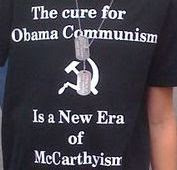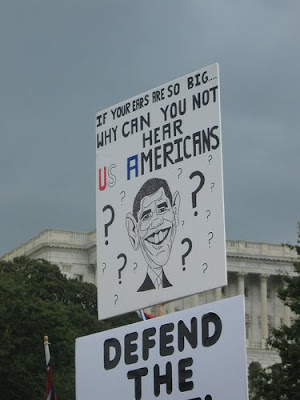
Apologies. They're all in the news. As well as the people who apologized.
Or refused to.
Kanye West and Serena Williams did.
Joe Wilson did and then didn't.
He apologized to the President of the United States, but refused to apologize to his colleagues for his behavior. He was officially rebuked by the House.
A lot could be said for all three apologies, which weren't exactly apologies.
West said he rudely interrupted Taylor Swift's acceptance speech at the MTV awards, saying that it should have gone to Beyonce, because he's still upset about the death of his mother.
Williams issued a "Zen apology" for her X-rated outburst at Match Point. She was, she said, "in the moment".
And Wilson? Well, he was close to Zen saying that "I let my emotions get the best of me." But, he refused to apologize to the House, saying, “The challenges our nation faces are far bigger than any one member of this House. It is time that we move forward and get to work for the American people.”
Seven Republicans joined 233 Democrats in approving the resolution; 12 Democrats joined Mr. Wilson and 166 other Republicans in opposing it.
The spin doctors on the Left and Right have made us all dizzy with the rhetoric of victory, snatching a word here and a phrase there and weaving it into a crown.
I'm more concerned about apologies - or lack or refusal thereof - as a further evidence of the demise of civility in our culture. I think it has a great deal to tell us about the nature of fear and the central message of the prophets and the gospel of Jesus Christ.
My memories of my childhood apologies were much like that of Williams, West and Wilson. I either offered excuses ("I'm sorry but s/he hit me first") or forced by my mother, (Mother: "Apologize to your brother RIGHT NOW!" Me: (Hand on hip, teeth grit) "Okay! I'm sorry."). Neither was either adequate or sincere.
I understand being "in the moment". When I was outraged that I had gotten into trouble with the authority figure of my young life for defending myself, I could hardly be expected to offer a sincere or adequate apology, even though I understood, on some level, that my actions hardly helped the situation.
I also understand offering excuses. It's important, when you've embarrassed yourself, to try to explain the context of the situation. Equally important is to understand is that when someone asks, even earnestly, why you did what you did, that the trap is that your explanation will always sound like an excuse.
I've learned this lesson the hard way. It's always better to stick with a sincere but simple, "I'm sorry." When I hear myself say the word "embarrass" I know that this is a clue that, if I say any more, I'm only going to dig the hole deeper into the Hole of Embarrassment.
Being required to apologize - especially a public apology - rarely produces a sincere or adequate apology, so I understand the resistance to it. However, there are times when standards of discourse and civility absolutely demand it. The best thing is to find the higher ground, even if you feel you were - still are - right, and apologize for the result of your behavior or words.
This is precisely what happened when the Primates of the Anglican Communion demanded a public apology from the House of Bishops in The Episcopal Church for the election and consecration of Gene Robinson.
What the House of Bishops said was that "we regret" the impact of our actions on the certain parts of the Anglican Communion. That was, at least, truthful. To have apologized would have been to admit we/they were wrong, which they/we were decidedly not. They took the higher ground and told the truth about the state of our souls and psyches.
They did the honorable thing in a difficult situation.
That is usually enough for most reasonable people. It wasn't for many of the Primates and many of their flock, who now seek to find retaliation and retribution for what they consider a dastardly deed.
This is not an honorable thing in a difficult situation. Indeed, they have now created a situation in which they have compounded the difficulty and done more harm than the original event.
Which begs the question: What is to be done when one feels that an apology is not enough?
Take, for example, the issue of apology for a heinous crime or murder - especially one showing 'depraved indifference to human life'. Saying, "I'm sorry" doesn't go far enough. There must be consequences for actions and behaviors. That is the basis for our penal system - as well as capitol punishment.
The issue of apology for the Holocaust or Slavery brings up intense emotion on both sides - especially when the subject turns to that of reparations.
Some see Reparation as retribution for things they did not do. The cry goes up, "Why should we pay for something we didn't do - would never have done?" The complexity of how it is we have all benefited from systems of cruel oppression escapes us when our wallets are threatened.
This has lead one of my African American friends to lament that he wishes we would talk about "Reparation" vs "Reparations".
"Put that 's' on the end," he says, "and people see it as a dollar sign."
We've become a litigious society which has been carefully taught by the Litigators Among Us that an apology implies guilt and guilt implies responsibility and responsibility means, bottom line (and, we've all become obsessed with the bottom line), you are going to have to pay something - usually lots of money - to someone.
Hugh Settlements of Big Bucks has made some of us reticent and others of us cowards.
It takes enormous fortitude to put aside political and legal concerns to find our own moral compass to say the right words that convey our sincere regret and satisfy our social obligations to one another.
I've been thinking a great deal, these past few days, of
Bishop Barry Valentine. Bishop Valentine is a retired bishop - of Manitoba (Canada) and the retired assistant bishop of the Episcopal Diocese of Maryland in 1989.
When the history of this time in our common lives of faith is written, I suspect that the "shot heard 'round the Anglican Communion" will be identified as the
Baltimore Declaration.
The Baltimore Declaration was a piece written by six Episcopal priests in the Diocese of Maryland in 1991 regarding affirmation of orthodox Christianity. It is sometimes used as a manifesto by Episcopalian factions which wish to reaffirm orthodox Christian principles within the Episcopal Church
The signers were (see if you recognize any of these names): The Rev. Ronald S. Fisher, The Rev. Alvin F. Kimel, Jr., The Rev. R. Gary Matthewes-Green, The Rev. William N. McKeachie, The Rev. Frederick J. Ramsay, The Rev. Philip Burwell Roulette.
You can read a brief summary of it
here. For some reason, I was unable to find the entire document - even 'blocked' at one site. Hmm . . . Strange. But, I digress.
UPDATE: Thanks to "Kevin," you can find a full copy of the document
here.
The Bishop Diocesan, Ted Eastman, made what he thought was a very strategic move in asking Bishop Valentine to be his Assistant rather than calling for a Bishop Suffragan.
Bishop Valentine's credentials as a conservative Anglican were absolutely sterling. There was a growing unrest in the diocese, stirred up by the aforementioned clergy, who called for a return to "biblical orthodoxy". Bishop Valentine could speak to them, using their language, and be their pastor.
Something happened. I don't remember the details, if I ever knew them. Bishop Valentine said or did something that eroded the trust between he and Bishop Eastman. It was clear that the two men could no longer work together.
Bishop Valentine retired his position.
Oh. My. God.
While I might not remember the details of the disagreement, I do remember the fall out. The press was all over the story like Old Bay on steamed Maryland Crabs.
I also remember the public statement by Bishop Valentine. I don't remember the exact words, but it went something like this, "I deeply regret what has happened. Anything more I could say would be less than helpful at this time."
And then, he quietly returned to Manitoba.
Now, that takes class. Oh, yes, and spiritual depth and maturity.
Which leads me to my point.
Scholar and modern prophet Walter Brueggemann argues that “fear not” is the primary message of the Gospel. I think he's right. The problem is that I hear the words "fear not" as a challenge to find that little switch in my psyche that can instantly turn off my fear.
It ain't that easy. Not in my experience, anyway. Not when I have to sort through what it is, exactly, that I fear. Especially when I'm expected to apologize and make it both appropriate and sincere.
I have discovered that saying, "I'm sorry," are two of the most powerful words in the English language. They are only powerful, however, when they speak the truth. And, to find the truth, I have to sort through my fear: embarrassment, being wrong, changing my mind or position . . . fill in your own blank.
There is a woman who is teaching me how to do this. It's a "negative lesson" but it is both effective and powerful.
She is a most unhappy person, mostly with herself. To 'outsiders' she is successful - lives in a beautiful home. Has a loving and devoted husband. Two wonderful children. One can only imagine the inner turmoil that brews inside her - or the 'internal scripts' she learned and memorized as a child - that lead her to be so hypercritical.
I can never do anything right in her eyes. And, when I do - when, on those rare occasions I do something right - and she offers a compliment, it doesn't take 15 minutes for her to balance that with a criticism.
It's taken me a while, but when she 'rebukes' me - always publicly - I have learned to step back psychically, take a deep breath into my soul and blow through my fears, find a place of truth in me and say, "I'm sorry to have disappointed you again."
It hasn't stopped her from being hypercritical, but it does stop her dead in her tracks. Every time.
It doesn't cost me much, really. I know I'll never change her. Her patterns of behavior are so set at this point that she's not even aware of her behavior.
Don't get me wrong. I'm far from perfect. My sins are ever before me and I know them well. I don't - can't, yet - do this with everyone, every time. But, I'm learning that relationships in community are worth the sacrifice it takes to find an expression of apology or regret.
And, that's the point. It's not so much about the situation or the regress - who's right and who's wrong. What political point is important to make. And, there are times and situations when it is important to speak the truth to power.
It is always important, however, to speak the truth, insofar as it is possible, in love. Sometimes, it is important to pull a punch and other times it is important to come out swinging.
The wisdom to know the difference, I am learning, arises from a place from whence self-knowledge arises. Part of that self-knowledge is to understand God's unconditional love for us and forgiveness of our sins the moment we express regret.
Knowing that we are loved and forgiven by God makes it easier to love and forgive others - or, at least express apology and regret before we're fully able to do that with sincerity and truth.
"Be not afraid," is a daunting challenge. It is easier to accept that challenge when we hear, before and after that statement, that God loves us, as Gene Robinson reminds us, beyond our wildest imaginings.





































